Railway of Death
Before the Japs came into our camp, stories of atrocities carried out by them were spreading, fearing the worst, we had to pile all weapons and ammunition in the open. Then a small party of Japanese checked that everything had been carried out to their commands, the trucks carrying the Japanese then arrived. Standing to attention and faced by an unknown enemy, the stories flooded through my head of Chinese men, woman and children being used for bayonet practice and allied units surrendering under a white flag in Malaya being shot and left for dead.
Our officers were allowed to take charge at first, the Japanese having set up two machine guns at the entrance to some tennis courts, placed us inside them. The following day our officers took charge and marched us to Changi Prison on the North-east end of the island. It was on the way I learnt of the massacre at Alexandra Hospital, a medical officer, Lieut. Weston had confronted the Japanese outside the hospital with a white flag only to be bayoneted to death. The enemy soldiers who seemed tall for the normal Japanese, then killed anything that moved, the patients didn't stand a chance. It was later reported that 323 died in the attack, 230 being patients, the rest medical officers and nurses. The hospital couldn't have been mistaken for anything else, all the medical officers were wearing Red Cross insignia and the hospital had a large Red Cross in the grounds, (it was later established that the soldiers that carried out the raid were the Japanese Imperial Guard and the raid was in retaliation for their losses by the Australians the days previous).
Being the nearest to Changi we were the first to arrive, later to be joined by the rest of the captive troops. Food was still being issued by our cooks at this time and it wasn't so bad, but within a week food and water were in short supply, the Japs then issued rice.
|
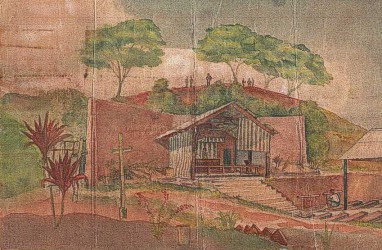
|
|
Roman Catholic Church Changi
|
|
In April working parties started to be taken away, our cloths, boots and belongings were taken from us only to be left with a loin cloth. If we didn't bow to a Jap we received a good beating, at first we hit back but you then found yourself in the guard room where six or seven very friendly Japs would try their best to put you in hospital for a week. Another punishment was to stand you to attention in the hot sun with nothing on, the Japs would stub cigarettes out on your body as they passed, given no food or drink you just feinted, then you were put in the cooler (a bamboo cage), for days on end with just rice balls and salt. The Sikhs and Bengalis from the Indian National Army were now helping the Japs guard us, if any goods were found being smuggled, they had the authority to give out beatings. This all had the desired effect and you tried to keep out of trouble, but you had to eat to live and smuggling food still went on.
In May I found myself in the hospital, rice did not agree with our stomachs and dysentery and fever spread throughout Changi Prison. While I was in hospital, a big clean up of the dead in Singapore was ordered and Divisional HQ was amongst the working party to go, brother Jack came to see me before he departed and gave me his ring and watch to look after for him, I didn't see him again for nearly a year. I left hospital on the 23rd May, having been there for a week I had lost contact with many of my mates who had been moved in working parties around Singapore.
Working parties had increased, and on the 18th June my turn came, I was now feeling a lot better but the food and conditions at Changi were very bleak, rice and green leaves were our diet, the water had to be boiled and the sanitary conditions were terrible, so I was glad to get away. With a party of 600 others under the command of Major R.S. Sykes of the 18th Division, Royal Army Service Corps, we were herded into cattle trucks and driven up Malaya and into Thailand. After five days in those cattle trucks, which were very cold at night and stiflingly hot during the day, we were very grateful to arrive at Non Pladuk and were treated very well, the food was a lot better then at Changi. Our first job was to clear a large area of trees and put up our atapi shelters, we were told a Japanese workshop was to be built there, then word got around that it was to be the start of a railway line to go 415kms to Burma.
|
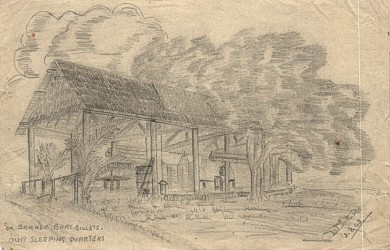
|
|
Atapi Shelter
|
|
Picture Supplied by Helen Elliott
|
|
As the Jap engineers started to arrived a cook house was set up, Jimmy O'Conner was Divisional HQ cook and he asked me to volunteer with him to help the Jap cooks. We settled down to making manjou cakes for the Japs, we had to grind the rice into a kind of flour by hitting it with a mallet, soya beans were then given the same treatment, then water was added to the rice making a kind of dough, the soya beans were then added and the Japs ate these raw. Jimmy had the idea of baking them like we would buns, he talked the Japanese cook into trying this, and they were an immediate success. The Japanese cook's name was Otto, he took us under his wing making about 1,000 manjou cakes a day using Jimmy's recipe.
By October the now infamous Death Railway was under way and the guards now arriving were Koreans and Sikhs, they were a lot more sadistic then the Japs, being held under by the Japs for a long time, it was now their turn to serve out the punishment and this they did with gusto. A large bamboo cane was carried by the guards, this was nicknamed the 'bamboo interpreter', if they wanted to get the message across, you would feel it on the most sensitive parts of your body.
Prisoners were passing through Non Pladuk to work further up the track, map of the camps, they were expected to clear virgin jungle with next to no food, dysentery, malaria and beriberi with hardly any tools and equipment. Prisoners were returning with various ailments but the large ulcers that ate their way into the legs were particularly nasty, the only way to stop the ulcer was to amputate the limb. Jimmy O'Conner developed bad sores on his arms and legs and the Japs decided he could no longer work in the bakery.
|
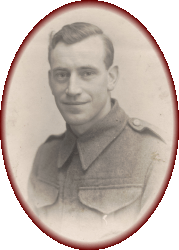
|
|
Brother Jack
|
|
Unfortunately Jimmy was sent upcountry where I heard he died, (Jimmy did servive and had a stall on Yarmouth Market after the war). At Christmas 1942 I was told some of Divisional HQ had arrived, so bribing a Jap guard with manjoui cakes, I inquired about my brother Jack, I found him looking very smart, in the gear he had picked up from the Red Cross in Singapore, he looked just like an officer. Going back to Otto, my Jap cook, I explained, tongue in cheek, that my brother was an officer and he could cook, Otto was only too pleased to have an officer working under him, so Jack joined me in the bakery. We worked together for almost 18 months, Otto satisfied with our help was kind and appreciative, he was a good Jap, Jack and myself smuggling out cakes for the hospital, getting the odd clip from a guard here and there but nowhere near as bad as the lads upcountry.
The Japs wanted the railway finished as soon as possible, so they introduced 'speedo'. The speedo was a another way to make us work, 'no work, no food' the sick were not an exception, if you didn't work you didn't get fed. I have seen men so sick they crawled to work, just to receive their rice ration. This verse was written with the despair and disbelief of the situation, special parade.
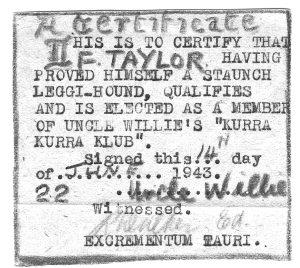 Kurra Kurra Club
Kurra Kurra Club
The Kurra Kurra Club was formed at Non Pladuk camp, to help the sick survive. The official description of the club was :
'A club formed in order to buy medical stuffs etc, for the ever increasing sick.'
The Thais were very good to us risking everything to get food into the camp. At this time an incident happened that still through all the despair of the speedo brings a smile to my lips. A Japanese guard found the call of nature so overwhelming he squatted down after placing his gun against a tree, a Thai took the gun in a flash, it was so funny to see the Jap running after him with his trousers round his ankles. The Japs feared the Thais and although being taunted to go into the jungle, he refused, even though he knew punishment would follow.
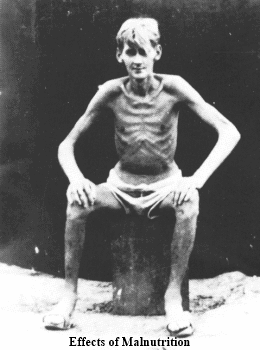 The Jap engineers were by now needed elsewhere and Jack and I were sent further up the railway. The food was very poor, the living conditions were deplorable and the guards pushed even harder. Then when the monsoons of 1943 hit us and the cholera followed. Your mates feeling ill in the morning were dead by night time. There was also a terrible stench in our camp from the fires that burnt the corpses, the nightmare that all the men were not dead when they were placed in the flames will never leave me. The Japs 'speedo' caused many deaths by malnutrition, men just gave up the fight to live and died. To think of home was a quick way to the grave. In these bleak days I talked to my father who had died some five years previous, he was always with me and I would not have made it without his help. The vitamins from the manjou cakes helped my body survive this ordeal, just going below 9st, but as for my mind time will tell.
The Jap engineers were by now needed elsewhere and Jack and I were sent further up the railway. The food was very poor, the living conditions were deplorable and the guards pushed even harder. Then when the monsoons of 1943 hit us and the cholera followed. Your mates feeling ill in the morning were dead by night time. There was also a terrible stench in our camp from the fires that burnt the corpses, the nightmare that all the men were not dead when they were placed in the flames will never leave me. The Japs 'speedo' caused many deaths by malnutrition, men just gave up the fight to live and died. To think of home was a quick way to the grave. In these bleak days I talked to my father who had died some five years previous, he was always with me and I would not have made it without his help. The vitamins from the manjou cakes helped my body survive this ordeal, just going below 9st, but as for my mind time will tell.
|

|
|
The Finishing Ceremony of the Death Railway
|
|
The Death Railway was finished in November 1943, 415kms in length, over 150 million cubic feet of earth was moved, and nine bridges were built (including the Bridge over the River Kwae), the cost in lives was 16,000 allied troops and over 100,000 Asians, later it was said 'for every railway sleeper laid a life was lost'.
When the railway was finished the Japs gave us more food and let us have other activities. I scrounged some paper and saved it for a Christmas Card for home, not knowing if it would get there, these were the times when the family could not be kept from ones mind.
The Japs gave us Christmas day off and it was spent laying on ones bamboo bunk thinking of home. Were they OK, was everything alright, were they still there, this was a far cry from home.
The cooks did their best with what they had and we did have a sing song in the evening.
|
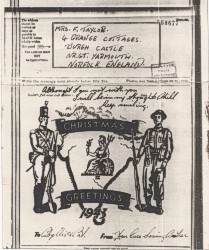 1943 1943
Xmas Greetings to Both my Darling Wife & Baby
In Thailand Phil & Pat & though this day seems so dismal & unrealistic, it is brightined by the thoughts & love of my darlings. God Bless You my Dears, Pray next year he will allow us to spend it together
XXX
Fred
|
|
|
|
Xmas Menu at
P.O.W. Camp. Non Pladuk
Thailand
Breakfast
Rice Porridge - Fish & Rice Risole
Lunch
Stew & Rice - Pork Risole
Dinner
Pork Stew & Rice - Meat & Rice Risole
|
|
|
|
The Japs even let us play football at Chungkai. Before being called up I had damaged my knee playing and promised Phil I wouldn't play again, but the temptation got the better of me. I played centre half for the Norfolks and can even boost of playing centre half for England in the camps
|
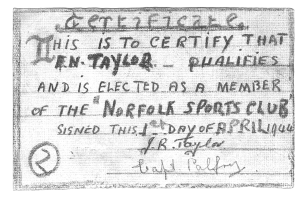
|
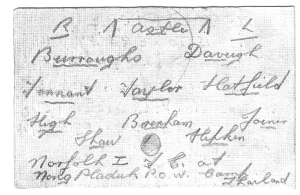
|
|
Norfolk Sport Club & Football Team
|
|
Chungkai Camp
(Map from Unknown Source)
The best football matches were against the Japs, they couldn't play the game very well and although under nourished, we were bigger then them. It is the only time in captivity I can truly say I enjoyed their company. Meeting them as equals in sport, tackles went unpunished and we beat the hell out of them.
|
|
|
|
|
|

|
Previous Page
|
Next Page
|

|
|
|
|
|
|
|